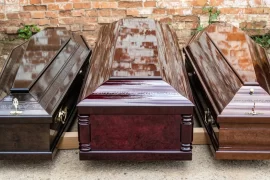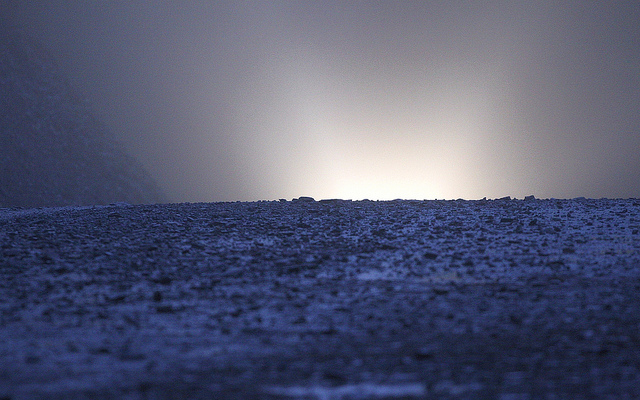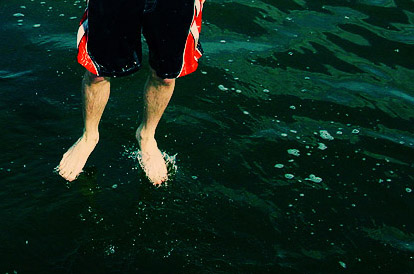Mike Heppner
Purchase a copy of We Came All This Way from Thought Catalog here.
It’s night, and I’m cold as fuck. The man driving the boat hasn’t spoken the entire trip. He has a broad back and a fat neck, and he likes to drive fast. Dr. Snow introduced him as Pål from Norway. He’s blasting heavy metal on a cassette player that rattles around as the boat skims the waves. There are times when the boat feels airborne. Cold spray crashes all around us. Pål drives with one hand on the polished wood wheel and keeps the other in the back pocket of his jeans, thumb out. The song is all noise. I think it might be the Scorpions. It sounds before my time.
We’ve been out for forty-five minutes, an hour. Snow thinks we might be halfway there. The moon over the water looks bright, over-bright. Something’s wrong with it. It’s what the moon will look like once the earth’s atmosphere has all burned off and there’s nothing left to protect us. It’s bright and round and fully three-dimensional—a ball, not a disc—but when the light hits the water it’s giggly and girly. It’s Star when I tickle her.
As for Star, she’s being choked by her life vest. It’s a vest instead of a jacket, so it hangs around her neck and sticks out like a crazy orange beard. The adults have life jackets that fit around the arms and snap up the front; there’s status in that. My life jacket is glow-in-the-dark chartreuse. It’s never been worn before, and my name’s on the back in black marker. I can’t imagine surviving if I fell overboard, with or without the jacket. The water is dark and cold and empty. There’s nothing living in it, just dumb, building-sized mollusks, and it has no bottom.
Snow is screaming in Pål’s ear, something about turning on the transducer. I know it’s a transducer because there’s a steel box near Pål’s steering wheel marked TRANSDUCER. I don’t know what it does, though. Pål takes his left hand out of his back pocket and flicks a switch on the box. I expect him to be missing at least one finger.
Star wants to pull off her life vest, and I have to tell her three times to leave it on. “It looks good on you,” I say. “It makes you look like you’ve got a weird beard. Don’t you want a weird beard?” Wallis is dozing on the floor. For safety reasons he’s not in his wheelchair. If the boat flips over we’d all be at an equal disadvantage. We’d all be in the same boat, heh. Mandy is the only one of us who doesn’t have her life jacket fastened all the way to the top; instead she leaves the top two fasteners open, casual-style. Her long hair is piled and tucked under a baseball cap that says “Marine Corps Devil Dogs.” Her boots are black and come all the way up over her knees.
Snow returns from the front of the boat to sit near Charity. She’s dressed for a snowstorm, her hair tied up in a bonnet. She’s chewing gum to counteract her motion sickness. She sees me watching her and gives me a toothy smile. Then she says,“You look cold.” Wind slices down over the boat and blows off her bonnet. The bonnet whips and flaps; it stays with the boat before finding its courage and peeling away.
Steffi prowls the rear of the craft analyzing weather conditions with a store-bought meteorology kit. She’s got a barometer, a fistful of maps and charts. She’s got the thing with the cups that spins around. Periodically she returns to report her latest findings. “The atmospheric pressure is dropping,” she says urgently, thinking she’s being helpful. She considers herself a full-fledged member of the team.
“Duh,” I tell her. Steffi is eight years old, a year and a half older than my daughter.
“The relative humidity is at seventy percent,” she says.
I cover my mouth with both hands and shudder sarcastically. “We’re all going to die.”
A bottle of Jameson whiskey circulates back to me. I wipe it off with my sleeve and take a drink. In addition to Pål, Snow, Mandy, Wallis, Charity, Steffi, and Star, four others are on board, two men and two women. I only know their names, and even those I’ve forgotten. Neil and Sander are leading the other two boats that have also departed for Mobility. We’re the last wave; Sander’s boat left first, followed ten minutes later by Neil’s. If I squint real hard, I can just make out a tiny red light in the distance. I miss those guys. No one in our group really seems in charge.
I consider offering Star a sip of whiskey but don’t. She’s been nagging me for a juice box ever since we left. “We don’t have juice boxes. There’s not a single juice box on this boat. If you can find a juice box, you may have it,” I say.
She tries flattening her life vest to her stomach but it springs back up when she moves her hand away. “It likes you,” I say.
Securing the cap on the Jameson, I walk low to keep my balance and nudge Wallis with the bottle. “How can you sleep?” I ask as he blinks awake.
“I wasn’t really. I’m not thirsty,” he says.
“It’s whiskey. You don’t drink it because you’re thirsty.” I offer it to him again, and this time he takes it. Wallis isn’t much of a drinker. I’ve never seen him intoxicated. Mainly he drinks ginger ale, cold tea, water.
“I have so much to do,” he says. I sit next to him, my body turned to keep an eye on Star. Waves bang and roll. My last swig of whiskey feels parked behind my Adam’s apple.
“You have nothing to do. We just need to get through this ride without puking. I don’t want to throw up. I throw up once and then I can’t stop. Constant puking for twenty-four hours,” I say.
Wallis closes his eyes and moistens his lips with his tongue.
Mandy hurries to the front of the boat, a pair of binoculars swinging from her neck. I like her boots. They’re tight, form-fitting.
Peering through the binoculars, she sings out, “Closer!”
“What time is it? I’ve lost all sense of time. My watch stopped working—I think I got water in it,” I say.
Charity and Snow join Mandy up front, each taking turns with the binoculars. Snow stands between them and puts his arms around their waists. The boat seems to be slowing down. Along with pitching forward, now we’re rocking from side to side. Pål isn’t at the wheel anymore; he’s digging through a storage chest, pulling out ropes, pulleys, and winches and setting them on the floor.
“Apparently no one is driving the boat. That’s what I’m getting from this,” I say, staggering to my feet for a better look. The wheelhouse—is that what they call it?—is abandoned. The wheel isn’t a classic ship’s wheel with long handles sticking out at all points. It’s just ordinary. It does nothing special except steer the boat.
Pål returns to the wheelhouse with a coil of rope around his arm. We’re getting ready to land or dock or whatever. I still can’t make out our destination. The mainland disappeared long ago, with nothing that I can see to take its place, just ocean. I watch in amazement as Pål sets down his rope and actually takes the time to flip over the heavy metal cassette and press play before seizing the wheel. The music starts up again and he relaxes back into his job.
I feel a hand on my shoulder. “Want to take a gander?” Mandy asks, passing me the binoculars. They’re heavy, huge. They’re made for someone else’s hands, not mine.
“I’m no good with binoculars. I never know where to look,” I say.
She leads me to the front of the boat. I can barely stand. I don’t see the point in being on a boat if it sucks so much. The water’s violent—it’s gnarly. Fish must hate their lives.
Mandy aims the binoculars at a distant point of shaking gray and directs me to look. All I can see inside the binoculars are my own eyelids blinking. Then I spot something. It’s black and it’s big and it’s still so far away.
“Is that it?” I ask, handing back the binoculars.
“That’s Mobility. That’s your new home.”
I close my eyes and can still picture it. I feel like I’ve seen it somewhere before. The Eiffel Tower—but an ugly Eiffel Tower. A clunky Eiffel Tower. It’s steel and concrete and must be tall to loom so high over this empty patch of ocean. Where are we exactly? Think of it like this: you’re on a plane en route from New York to London. You’ve taken off and you’ve been flying for an hour. The stewardesses are just coming round with their drink cart. Some passengers have already gone to sleep. You’re at cruising altitude and you’ve leafed through the in-flight magazine twice. You’re too high up to see anything out the window, just clear atmosphere. Okay: we’re down there somewhere.
Star asks for the binoculars. She handles them expertly, even knows how to refocus them. Where did she learn that? Probably from Steffi.
“What do you think, kid?” I ask.
She slowly lowers the binoculars. She looks disappointed—or maybe she’s just tired or not feeling well.
“Is it going to be bouncy like this?” she asks.
“What do you mean—is it going to rock back and forth like a boat? No, I don’t think so. No, it’s too large. It’ll be like being on a big cruise ship. Not even that—it’ll be like being on an island. Islands don’t rock back and forth, and they’re big and they’re in the middle of the ocean too.”
I’m just making things up. I don’t know anything about Mobility. I don’t know if it rocks and moves around or stays anchored in one place. I wonder how we’ll get up to it, if we’ll have to climb a ladder or take an elevator.
Snow pops round with a walkie-talkie. “We’ve just heard from Sander. The first group has arrived. One of the power generators isn’t working. We’ll need to fix it in the morning.”
“What does that mean?” I ask. Star snuggles against my leg.
“It means we’ll be running on limited capacity for a few hours. We’ll get through it. We’ll have flashlights, battery backup. It won’t be the last hardship, I’m sure.”
“Mom!” Steffi cries across the boat, and we look to see where she’s pointing. The visibility’s poor but a shape clarifies about a half-mile on the horizon. Suddenly it’s there, solitary and huge. It seems to have no interior space, no walls, just an open network of girders like something left unfinished. The structure rises out of the water on enormous, thick piers. Coming a little closer reveals a network of criss-crossing beams, faint auburn light glowing from inside. It’s ugly and awesome. I literally, physically, actually, swallow my gum.
“Don’t let the appearance fool you. It’s quite comfortable on the inside. Plenty of room for all of us. Sleeping quarters for eighty, not that we’ll need it at first. Most of the rooms we’ll be using have private bathrooms. Two mess halls, both of them spacious. The communications center is state of the art. The medical wing needs work but it’s coming along. By the end of the year we’ll have a fully-equipped recreation facility up and running. There’ll be a banquet hall for special events, a library, maybe even an aquarium to house some of the local fish species,” Snow says. Charity kisses him on his blue cheek.
Pål slows the boat, and Snow yells at him to turn off his music. For the first time I really hear the ocean, waves applauding. The sound is big and constant, lacking contour. The waves break upon themselves.
“What time zone is this?” I ask, but no one answers. Maybe it doesn’t matter. It’s whatever time zone we say it is.
“Crim, come look,” Snow calls back to my brother.
Getting Wallis to his feet takes three of us, Mandy, Pål, and myself. I hold him under his armpits, which are hot and perspiring. I haven’t carried him in a long time. I used to be able to do it by myself, when we were kids and I was the only person he’d let near him.
We lean him up against the boat’s side rail, Mandy and I holding him by the elbows. His legs dangle down like roots.
“How ’bout it?” I ask, watching his face. His first reaction is important to me.
Before he can answer, his torso buckles and Mandy and I gently set him down. He throws up on his chest, a small, brown puddle. It seems more like an emotional response than a physical one.
“Sorry,” he says, “waves got to me.”
We clean him up and get him positioned in a chair as the others prepare for disembarking. Mobility is no longer an object on the horizon. There is no horizon anymore; there’s just this huge, multi-level contraption ahead of and above us. The support piers rise high up into the sky, and the lower deck casts everything in shadow. Pål has switched off the engine. We’re basically drifting.
“Remember this moment,” Snow speaks from the front of the boat, one foot on top of Pål’s storage chest. The wind blows his beard back. “The sounds, the smells. Remember what you thought and felt. You’re passing through customs. There are no forms to fill out. You’re leaving your old self behind.”
Mike Heppner is the author of two novels, The Egg Code and Pike’s Folly, a short fiction collection, The Man Talking Project, and a novella, Nada. He lives in Arlington, Massachusetts.





